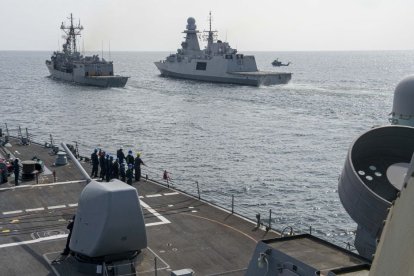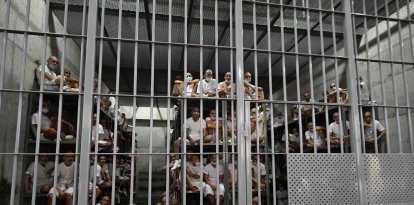Israel fighting on seven different fronts, says Defense Minister Yoav Gallant
With the involvement of Iran's proxies, the escalation of the conflict threatens regional stability in the Middle East.

(
The increasing involvement of Iran's proxy groups against Israel has further complicated the situation in the Middle East. Israeli Defense Minister Yoav Gallant assured that the country is currently fighting on seven different fronts and warns that the situation may affect more parts of the region in the coming days.
According to Gallant, who addressed the government Tuesday, Israel is receiving attacks from Gaza, Lebanon, Syria, the West Bank, Iraq, Yemen and Iran. "We are in a war on several fronts and they are attacking us from seven theaters," he added.
Attacks on U.S. bases in Iraq
Gallant's words coincide a day earlier with a new drone attack against U.S. bases in Iraq. The attack, which has been blamed on Hezbollah, left at least three people injured at the Erbil Base.
Erbil is located in northern Iraq, in the autonomous region of Iraqi Kurdistan. After the drone strike, U.S. troops responded with several artillery strikes against Hezbollah positions, according to U.S. Central Command.
"These strikes are intended to hold accountable those elements directly responsible for attacks on coalition forces in Iraq and Syria and degrade their ability to continue attacks. We will always protect our forces," said General Michael Erik Kurilla, head of U.S. Central Command.
The group behind these attacks on U.S. bases is Kataib Hezbollah, which receives support, financing and orders from the Iranian Islamist regime. It is not the first such attack in the Middle East since Hamas launched its offensive against Israel and the IDF counterattacked with its ground invasion of Gaza.
Houthis in the Red Sea
Yemen's Houthi rebels continue their aggressive activity in the Red Sea. Although Prosperity Guardian, an international coalition led by the United States, announced last week the deployment of a prevention force in the Red Sea, the Houthis maintain their involvement in the escalation of the regional conflict.
The deployment of the preventive force came after a number of large merchant companies announced the cessation of their operations through the Red Sea. From the Strait of Bab el Manded, west of the Gulf of Aden, to the Sinai Peninsula, the Red Sea is the gateway to the Suez Canal, an important transit route for global supplies.
The British Maritime Authority, which is involved in the deployed force, said on Tuesday that missiles had been sighted off the coast of Yemen near Houthi positions, and advised ships traveling through the Red Sea to travel with caution. They also said they had also detected multiple explosions in the area throughout the day, although there were no casualties.
RECOMMENDATION





















